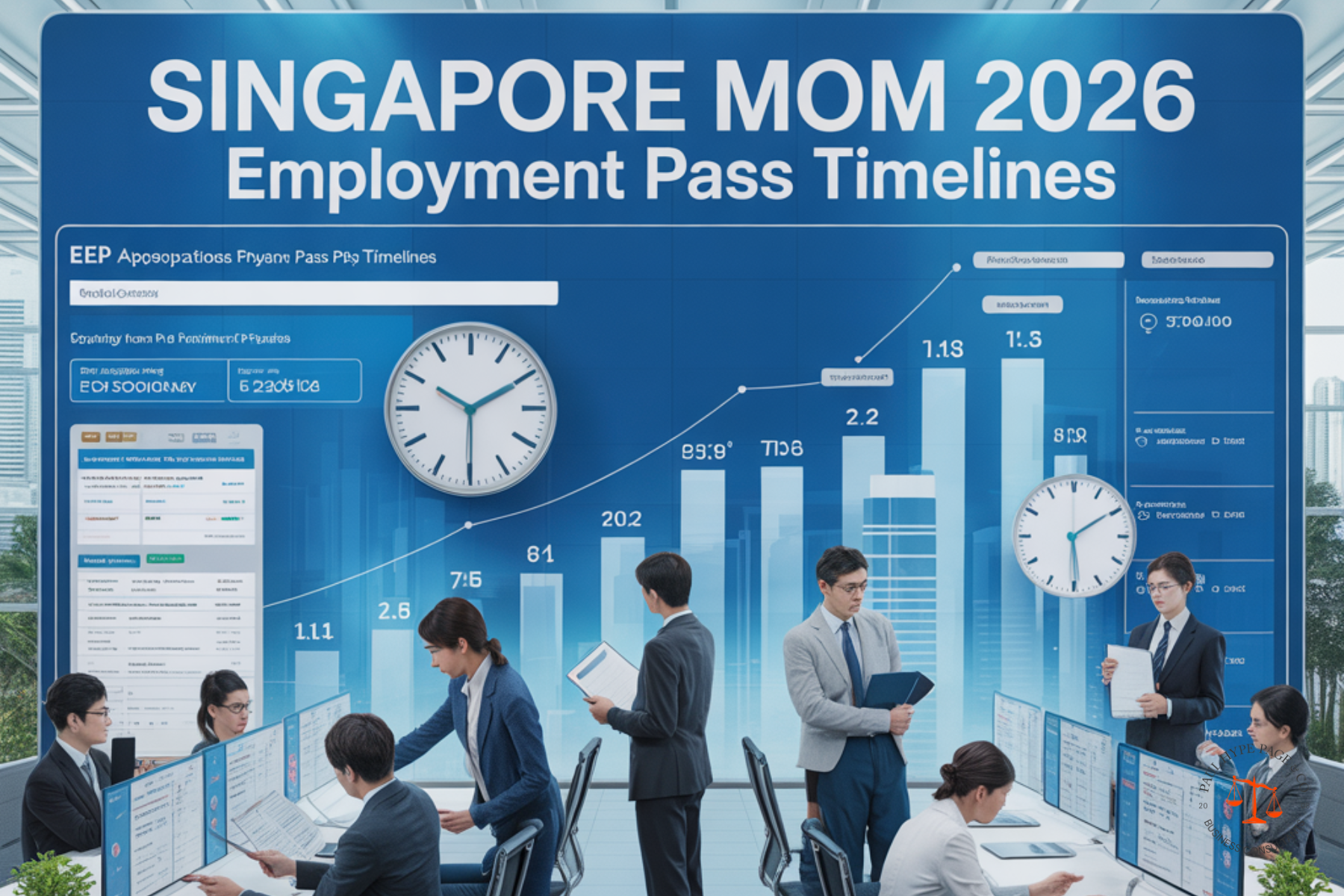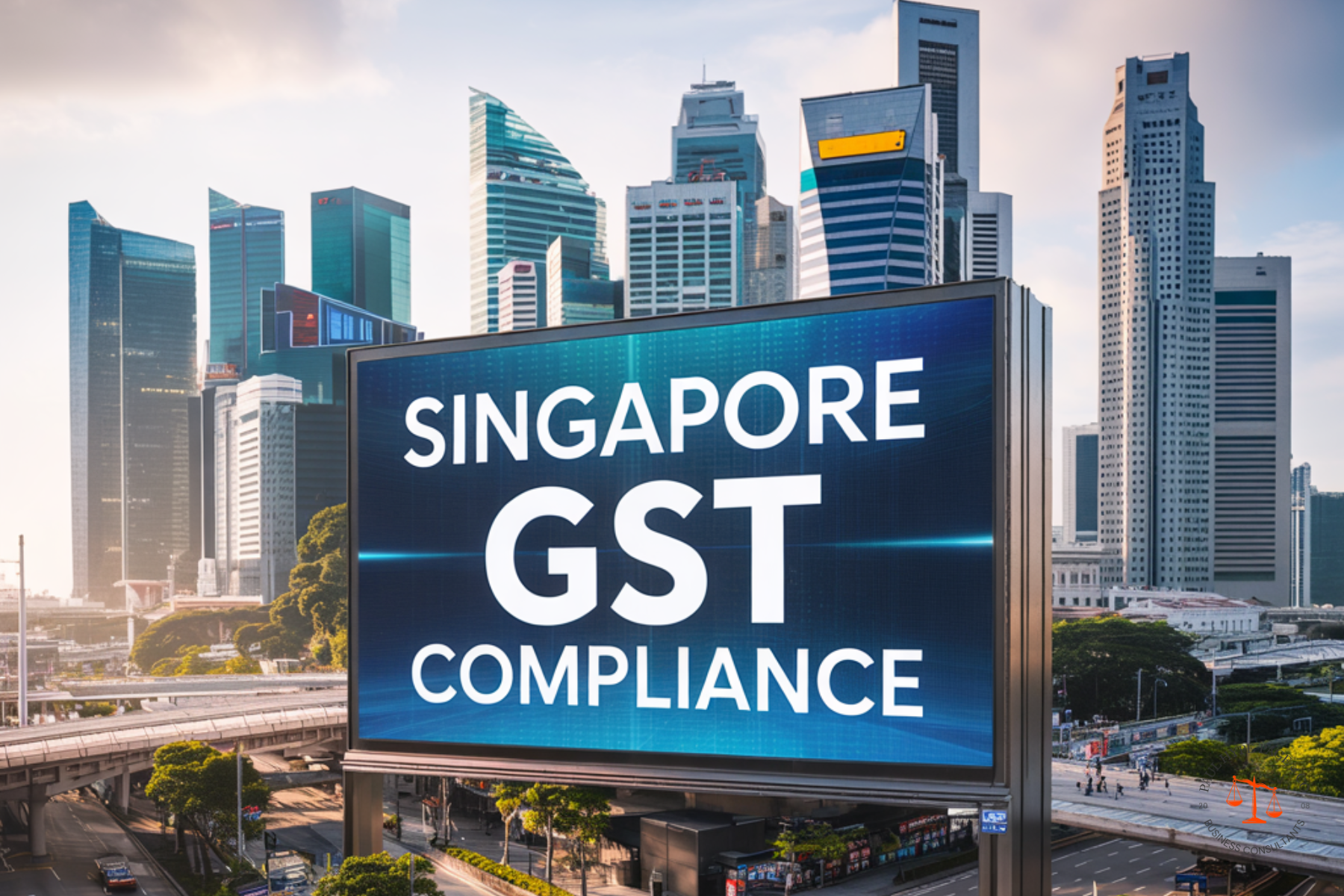Outline
- Introduction: Why Singapore Employers Must Rethink Hiring for 2026
- What Changed in MOM’s New EP Processing Standards for 2025–2026?
- How These New Timelines Impact HR Teams and Foreign Candidates
- What HR Teams Must Do Now to Prepare for 2026 (Future-Proofing Guide)
- What Foreign Professionals Must Do to Prepare for 2026
- Conclusion: 2026 Will Reward Prepared HR Teams and Penalise Reactive Hiring
- Get ahead of Singapore’s 2026 EP requirements.
- FAQs

Introduction: Why Singapore Employers Must Rethink Hiring for 2026
The Ministry of Manpower (MOM) is tightening Employment Pass (EP) and S Pass processing standards. What used to take weeks can now take months, and by 2026, the checks will be even stricter. Singapore is shifting toward a higher-quality, better-governed, more transparent foreign manpower system — and this directly affects how HR teams plan recruitment.
Longer EP timelines mean:
- Hiring cycles become unpredictable
- Projects risk delays
- Foreign candidates face stricter proof requirements
- Companies must demonstrate stronger compliance
- COMPASS scoring becomes more critical
- Missing or inconsistent documents trigger automatic reviews
The message is clear: 2025 is the adjustment year — 2026 is the enforcement year.
This article helps HR teams future-proof their hiring process, while also guiding foreign professionals on how to prepare for a more rigorous Singapore work pass environment.
What Changed in MOM’s New EP Processing Standards for 2025–2026?
MOM is increasing scrutiny on both employers and foreign applicants. Applications are no longer judged on eligibility alone — they’re reviewed on:
1. Document accuracy
Any mismatch (job title, employer name, salary, dates) slows processing.
2. Employer track record
Companies with weak HR compliance face more checks.
3. Verification of educational qualifications
More degrees are flagged for external checks.
4. Salary benchmarks aligned to market norms
Inflated or mismatched salaries raise red flags.
5. COMPASS scoring justification
Every criterion must be verifiable.
6. Additional information requests (RFIs)
More RFIs are being issued to clarify job scope, skillset, and employer operations.
Many HR teams are reporting processing times of:
- 2–6+ weeks for EP
- 4–10+ weeks for appeals
- Longer if verification is required
By 2026, companies that submit incomplete or poorly justified EP applications will experience even longer delays.
How These New Timelines Impact HR Teams and Foreign Candidates
1. Hiring cycles now require 8–12 weeks instead of 4–6
This affects:
- Project delivery timelines
- Role handovers
- Budget planning
- Contract start dates
- Relocation arrangements
Gone are the days of “hire now, onboard next month.”
2. Job descriptions must be more realistic and evidence-backed
MOM now checks whether:
- Job titles match responsibilities
- Responsibilities match qualifications
- Seniority levels match past experience
- Salary matches industry norms
Inflated titles or unclear scopes trigger verification.
3. Documentation mistakes now cause major delays
Most EP delays occur because of:
- Inconsistent dates
- Missing degree pages
- Unverified certificates
- Mismatched job titles
- Incorrect company details
- Unclear org charts
- Unsigned contracts
Companies used to resolve these issues after submission. In 2025–2026, MOM expects zero errors at submission.
4. COMPASS scoring becomes the core approval determinant
COMPASS will evolve in 2026:
- Salary thresholds may rise
- Skills bonus criteria may expand
- Diversity scoring may be recalibrated
- Additional industry-specific rules may appear
HR teams must plan hires around COMPASS, not after.
5. HR’s operational governance will be directly evaluated
Companies with:
- Missing CPF contributions
- Late ACRA filings
- Poor financials
- Weak local hiring practices
- High foreign-to-local ratios
…will face slower approvals.
This is exactly why a professional compliance ecosystem (incorporation, payroll, accounting, tax, HR documentation) creates an advantage — a point consistent with PHP’s regional service strengths.
What HR Teams Must Do Now to Prepare for 2026 (Future-Proofing Guide)
1. Treat 2025 as a rehearsal year — 2026 will demand far stricter accuracy
MOM is shifting from “checking eligibility” to auditing compliance behaviour over time. HR teams should begin adjusting today by:
- Reviewing all past EP/S Pass submissions
- Identifying common errors and inconsistencies
- Closing gaps in HR documentation
- Updating hiring templates to match MOM guidelines
- Standardising job descriptions across departments
Companies that wait until new rules are announced will be too late.
2. Build a “2026-Ready EP Documentation System”
MOM is moving toward digital verification of everything:
- Education
- Salary history
- Employment records
- Company financials
- ACRA details
- CPF submissions
To prepare, HR teams need a structured internal system.
Employer Documents (must be pre-organised):
- IRAS filings
- ACRA filings
- Latest financial statements
- CPF contribution logs
- Organisation chart
- Employee list + roles
- Payroll records
Applicant Documents (must be pre-verified):
- Degree + transcripts
- Past employment letters
- Payslips
- Updated CV with clear dates
- Skills portfolio (if role-specific)
- Passport (full set of pages)
Companies who adopt this documentation system now will enjoy faster and smoother approvals in 2026.
3. Shift to predictive recruitment planning
With 8–12 week timelines becoming normal, HR teams must shift from reactive hiring to forecast-based hiring.
Implement 3 forecasting layers:
A. Quarterly headcount forecasting
Predict vacancies based on projects, resignations, expansions.
B. EP feasibility scans before job ads
Check:
- COMPASS score
- Expected salary vs market
- Local hiring feasibility
- Skills bonus eligibility
C. Early candidate engagement
Foreign candidates need weeks to prepare documents — HR must factor this in.
Predictive recruitment reduces:
- Project disruption
- Emergency hiring
- Last-minute EP rejections
- Overreliance on appeals
4. Design EP-safe job descriptions (JD 2.0)
Vague JDs = risk.
By 2026, MOM will demand clarity. HR should revise JDs to include:
- Clear scope
- Skill requirements
- Minimum qualifications
- Industry relevance
- Hierarchy and reporting relationships
- KPIs or measurable outcomes
Foreign candidates should adjust their CV language to match actual responsibilities, not inflated ones.
5. Build a COMPASS mastery framework internally
COMPASS will only grow in influence.
HR must understand:
- How salary benchmarks affect approval
- How diversity scoring works
- How the candidate’s skills align with Singapore’s manpower strategy
- How to earn bonus points (shortage skills, strategic sector bonus)
HR teams should run COMPASS scoring before issuing any offer.
6. Digitise HR compliance and eliminate data inconsistencies
MOM now cross-checks information across:
- ACRA
- IRAS
- CPF
- SkillsFuture
- Past EP records
- Ministry databases
Inconsistency = automatic delay.
HR must digitalise:
- Contracts
- Payroll
- CV archives
- Education verification
- Hiring templates
- Employment letters
This aligns with Singapore’s push toward digital corporate compliance .
7. Benchmark 2026 salary requirements — anticipate increases early
Salary requirements may change again, especially for older applicants and mid-senior professionals.
HR should:
- Create a salary framework for 2026
- Benchmark roles by age + experience
- Avoid offering excessive increments that trigger alarms
- Prepare justification documents for higher offers
Foreign candidates must also calibrate salary expectations realistically.
8. Strengthen employer reputation — MOM profiles companies heavily
MOM increasingly looks at an employer’s:
- Rejection rate
- Appeal history
- Payroll accuracy
- Contribution to local employment
- Corporate tax filing hygiene
- Operating history
A “clean and credible” employer enjoys faster EP approvals.
9. Improve communication with foreign candidates
HR should help candidates prepare:
- Verified degrees
- Clear CVs
- Reference letters
- Employment proofs
- Skills assessments
- Accreditation checks
A well-prepared candidate means fewer MOM queries.
10. Prepare for longer appeals and more RFIs in 2026
Appeals are no longer quick fixes. MOM now treats appeals like new applications, with deeper scrutiny.
To prepare:
- Maintain a record of past rejections
- Document reasons clearly
- Avoid repeating mistakes
- Prepare stronger justification letters
- Maintain transparent communication with candidates
What Foreign Professionals Must Do to Prepare for 2026
Foreign talent faces stricter expectations too.
1. Ensure all qualifications are verifiable
No unofficial transcripts, unaccredited schools, or documents with unclear seals.
2. Fix inconsistencies in CVs
Dates, titles, and responsibilities must be accurate.
3. Build a portfolio of skills and achievements
MOM values demonstrable capability.
4. Prepare proof of salary from previous roles
Payslips, tax records, and employment contracts may be requested.
5. Understand realistic salary benchmarks
Market-aligned expectations strengthen approvals.
Conclusion: 2026 Will Reward Prepared HR Teams and Penalise Reactive Hiring
The Employment Pass landscape is entering a new phase — more structured, data-driven, and strict. Companies that continue hiring the old way will face delays, talent loss, and repeated rejections.
But HR teams that:
- Forecast headcount
- Build documentation systems
- Master COMPASS
- Strengthen employer governance
- Digitise HR processes
- Improve candidate communication
…will enjoy smoother, faster EP approvals even under stricter 2026 standards.
This isn’t about beating the system — it’s about aligning with Singapore’s long-term manpower direction.
FAQs
Foreign professionals should organise all supporting documents early, including verified degrees, payslips, employment letters, updated CVs, and evidence of relevant skills. They should ensure their employment history is clear and consistent across LinkedIn, resumes, and past applications. Preparing this documentation upfront allows faster verification and prevents MOM from requesting additional information, which is a major factor in prolonged processing.
The biggest issues include mismatched job titles, inconsistent employment dates, unverified academic certificates, unclear job scopes, missing contract details, and employer-side compliance gaps. MOM also checks employer governance, so late tax filings, CPF issues, or unclear financials can slow applications even when candidates are fully eligible. Most delays are preventable through thorough pre-submission checks.
COMPASS now plays a central role in assessing EP eligibility, and its importance will grow in 2026 as Singapore refines skills-based hiring and sector-based requirements. HR teams should run COMPASS assessments early in the hiring process, document their justification for salary, qualifications, and role fit, and identify areas where the employer or candidate may fall short. The more evidence-driven the application, the stronger the approval odds.
The most effective step is developing a structured, 2026-ready documentation system. This includes standardising job descriptions, verifying candidate qualifications early, organising employer compliance documents, and aligning all details across contracts, application forms, and job ads. Strong documentation prevents MOM requests for clarification, reduces verification delays, and increases approval predictability.
MOM has introduced deeper verification checks to ensure foreign hires meet salary benchmarks, qualifications are authentic, and employer records are accurate. This involves cross-referencing ACRA filings, CPF contributions, past EP history, and education sources. These processes are expected to expand further in 2026 as Singapore moves toward a fully digital, compliance-driven manpower framework. HR teams should anticipate progressively longer timelines unless documentation is complete, consistent, and error-free.
Share This Story, Choose Your Platform!
Related Business Articles







